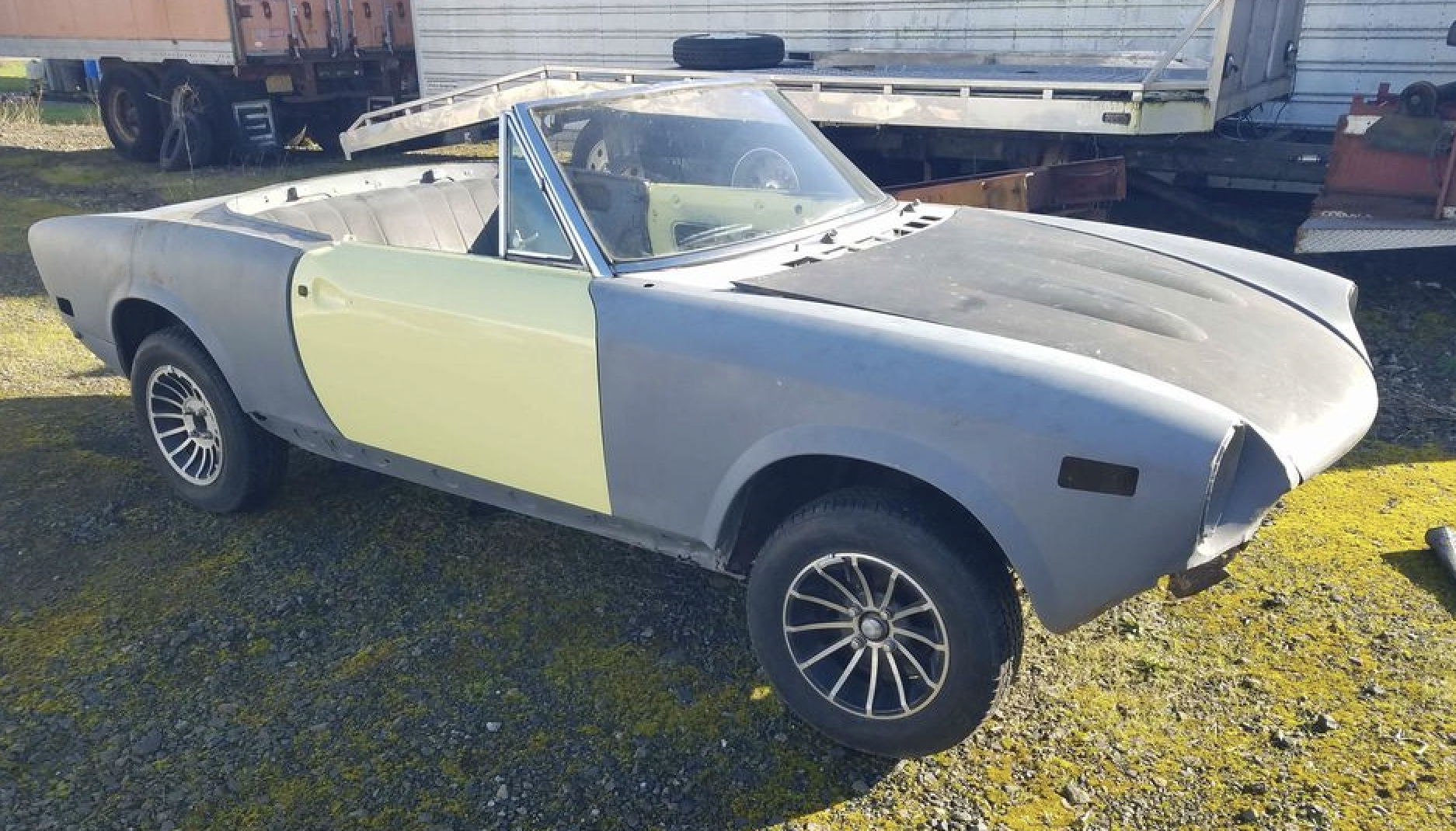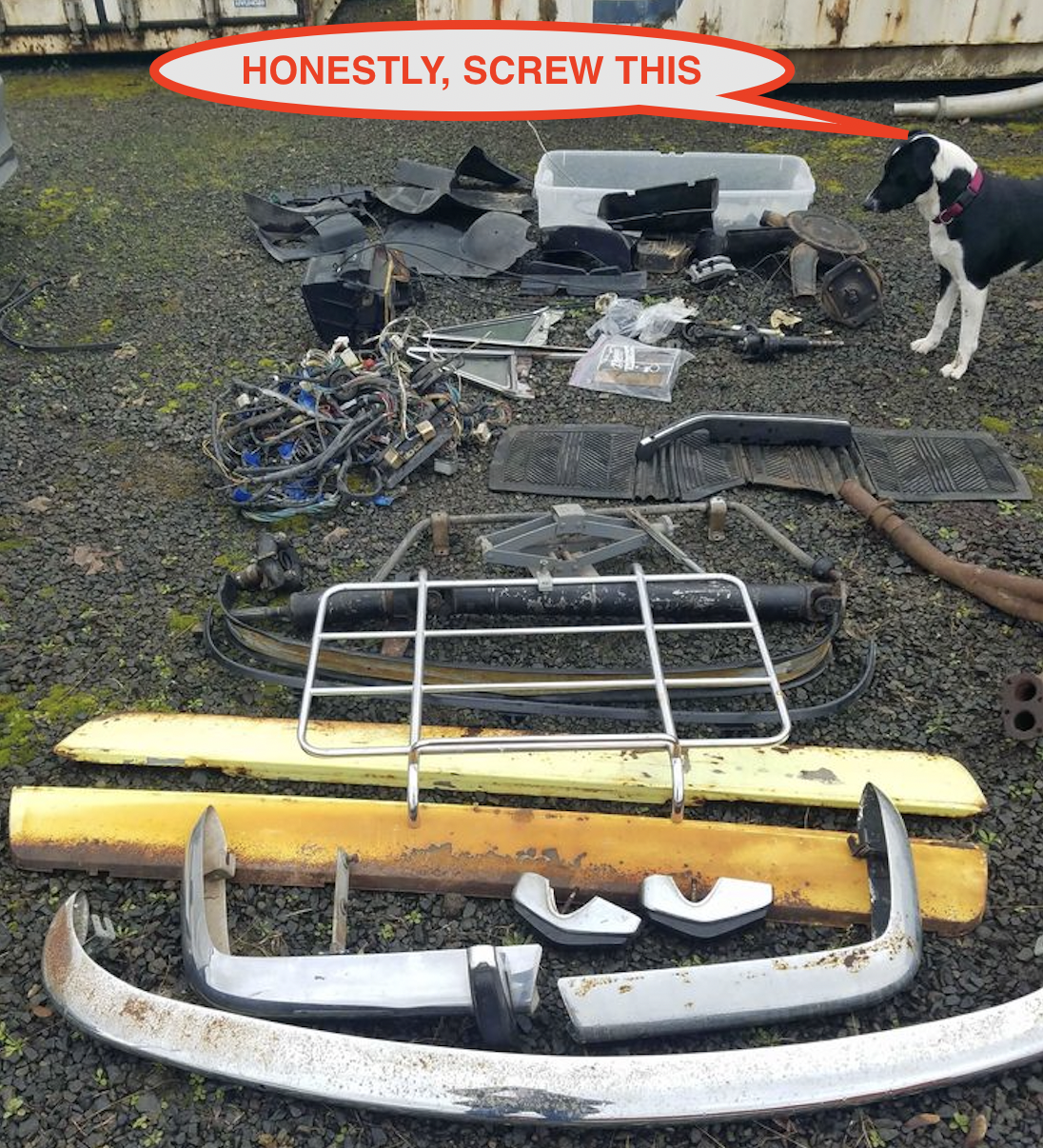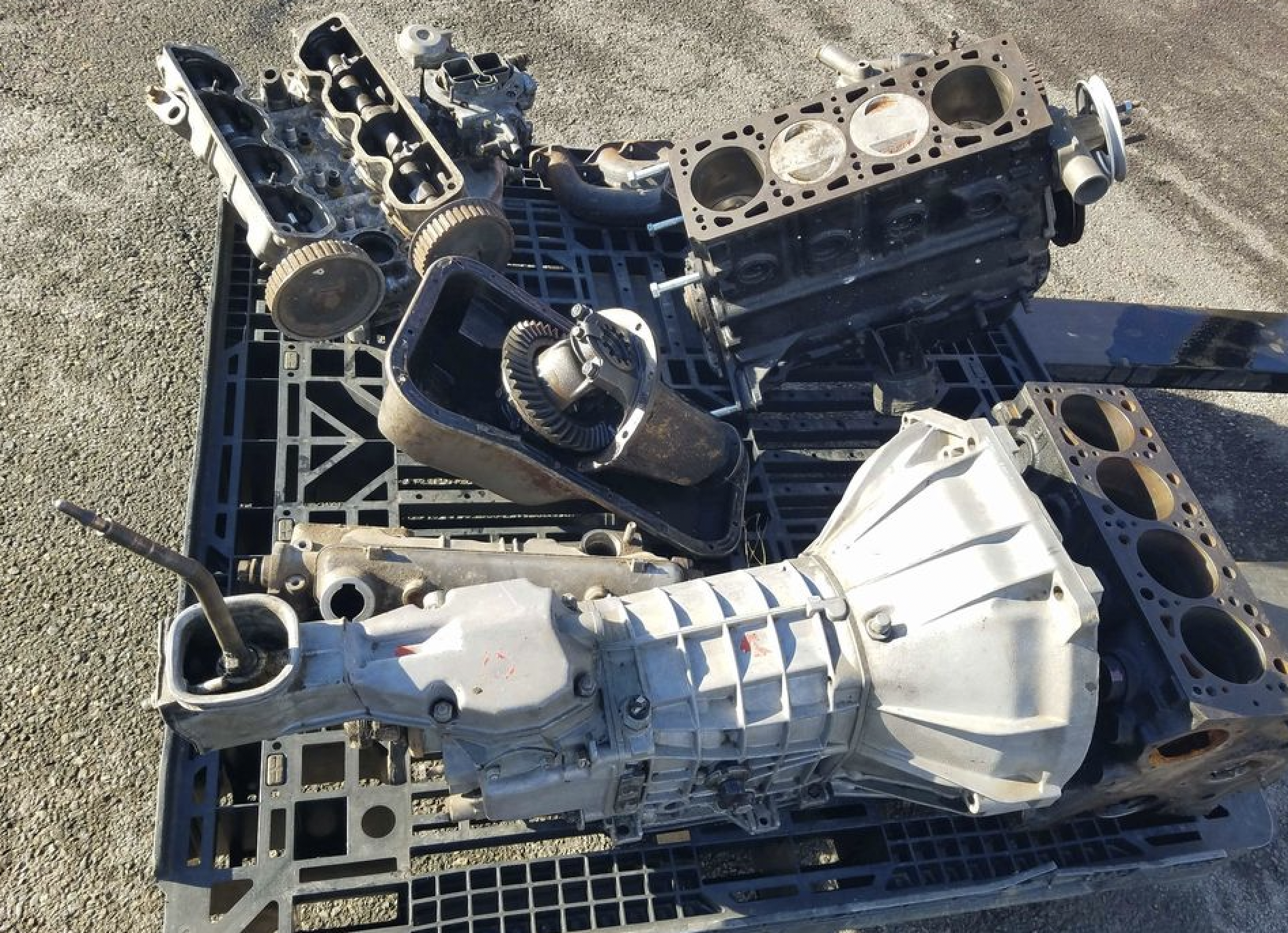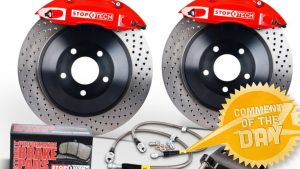Psst, hey, come here. You want a crappy old car that needs a ton of work? Well, look no further; we have just the thing! Two, in fact. Your choice! It’s day two of project car week, and we’re going to look at a pair of roadsters that you might possibly, if you really put your mind to it, have ready to drive by next summer. Or the summer after.
But first let’s see who you picked as victor in our Beetle battle:

This one was close, but it appears that the blue Beetle is our winner. It’s hard to deny the appeal of a running engine in a project car; even if you end up having to tear it apart later, at least you know it was once something besides an inert hunk of metal. I guess that means the orange Bug is still “Holding Out For A Hero,” which is too bad, because to me, that patina with the classic ’70s stripes is “Almost Paradise.”
There’s a car you might have heard of called the Miata. It’s kind of obscure, but it’s been around for a few years now, so there’s a possibility you have stumbled across one. Or two. Thousand. Well, you may not realize it, but the Miata is actually an homage to a whole class of small convertible sports cars sold decades earlier. These little British and Italian wonders were fragile, finicky, rust-prone nightmares that just happened to be an absolute blast to drive during those five days a year when everything was running right.
For a long time, these little headaches-on-wheels languished on the wrong side of the classic car tracks, but they’re starting to gain some respect. But there are still plenty of cheap basket-cases and barn-finds to be had, and we’re going to take a look at a couple now.
Some Assembly Required – 1972 Fiat 124 Sport Spider – $950

Engine/drivetain: 1.6 liter twin-cam inline-4, 5 speed manual, RWD
Location: McMinnville, OR
Odometer reading: 80,000 miles claimed, but you’d have to find it in one of those boxes to check
Runs/drives? You’re kidding, right?
You know you’re in for a rough ride when the first two words of an ad listing are “Failed project.” Somebody disassembled this poor little Fiat, realized they were in over their head, and just boxed it up. You’d have to carefully go through all those boxes to see if anything is missing, but it looks like all the important bits are there: complete rolling chassis, engine (with a spare longblock), gearbox, trim, interior pieces, top – it’s like a giant model kit. I don’t know about you all, but I love a good model kit.

Once you’ve finished repainting and reassembling it, you’d have a fun little car steeped in Italian sports car history. The 124 Spider was penned at legendary design house Pininfarina, who is responsible for about half of all the drop-dead gorgeous cars you can think of. Its twin-cam engine was designed by the same guy who designed racing engines for Ferrari, the fabulously-named Aurelio Lampredi. It’s the same basic engine that gave Fiat and Lancia a string of rally titles, including the Group B manufacturer’s title in 1983. Look up on the Mount Olympus of engines, and you’ll see the Fiat twin-cam sitting there in its rightful place among the greats.

You’ll want to have the head checked out by someone who knows these cars before bolting the engine back together. This is an early belt-driven-cam engine, and belt replacement was a strictly-enforced 30,000 miles. Plenty of owners ignored that service interval, and paid the price of bent valves; Lampredi’s little wonder is an interference engine.

This 1972 124 Sport Spider is a good vintage, before smog controls started sucking the fun out of sports cars. And in its current disassembled state, you can pretty much make it your own. Paint it whatever color you like, give that famous motor a pair of Weber carbs to breathe through and run it up through the gears on a nice summer day, just soaking up the sunshine.
I mean, in a couple of years, once you get it all back together. But you gotta start somewhere, right?
A Future In British Steel – 1976 MGB – $1,200

Engine/drivetrain: 1.8 liter overhead-valve inline 4, 4 speed manual, RWD
Location: Dayton, OR
Odometer reading: 88,900 miles
Runs/drives? Starts, but won’t stay running
The MGB, especially the late rubber-bumper one, is the Rodney Dangerfield of the classic car world – it gets no respect [Editor’s note: Just wanted to chime in here to brag that I actually get this reference, for once. It’s comedian Rodney Dangerfield’s go-to line in his standup routine. -DT]. Part of it is probably just that they’re common; MG produced the B for eighteen years, making over half a million of them. They’ve never been expensive, so they tended to get abused and neglected. Combine that with a primitive gremlin-prone electrical system and not especially good performance even when they are running right, and the natural habitat for a late MGB becomes that muddy patch of gravel next to the garage.

Which is a shame, because like the Fiat, this car has pedigree. MG started racing in 1924 and didn’t stop until British Leyland imploded in 1986. Stirling Moss set a land speed record in one in 1957. Carroll Shelby’s first race car was a 1949 MG TC. My dad wooed my mom in a 1961 MGA. There’s a lot of important history behind that octagon.

But as we’re all painfully aware, the 1970s did terrible things to cars, and the MGB was no exception. It lost its sleek chrome bumpers, first saddled with enormous rubber overriders, then replaced entirely by a massive black rubber nose, sort of the automotive equivalent of Groucho glasses. The ride height was raised an inch to meet new US headlight height requirements, upsetting its chassis balance. And smog controls choked the 1.8 liter B-series engine from a respectable 95 horsepower down to 63. All those indignities are reversible now, of course, but it does cost money.

But as starting points go, this little red B doesn’t look too bad. If it starts, then at least that miserable little paperweight of a Zenith-Stromberg carb is doing its job. I’d suspect that the fuel delivery problem is down to the SU fuel pump, which is electric, uses points that can burn out [Editor’s note: Yes, literally points in the fuel pump. I’d never heard of it myself, but I can say that of all cars to have an electrical technology I’ve never heard of, I’d rather it not be a British one. Fuel pump points in an MG sound like a nightmare. -DT]. It isn’t too rusty, what you can see of the interior looks all right (and I covet that aftermarket wood steering wheel), and everything else is available from Moss Motors and other vendors. And if you don’t want that aftermarket hard top, you could probably sell it to recoup some expense, even without the back window.
So there we have it – two flavors of do-it-yourself roadster fun, either pasta primavera or a good hearty bangers and mash. What’ll you have?
QuizMaker









This is a hard one, the correct answer is spending a couple grand more and get a scruffy driver rather than either of these two, but we weren’t given that option.
I have owned a rubber bumper MGB, despite saying I never would. It was more fun than I thought it would be, but it was still a rubber bumper MGB, all the slowness and antiquity of a 60s British sports car with a considerable amount of the aesthetic charm taken away. I was ready to say MGB just because it looks so much closer to being ready to drive, but as noted, the pics don’t show the bottom parts where they routinely rust, a lot, and most importantly, the Fiat has a motor that will sing, while the B slogs. Lastly, I have had about a dozen old British sports cars, never had an Italian, give me the blank slate Fiat.
I’d get the Fiat and mount a Ford EV crate motor in it. Or maybe one of those Yamaha EV crates.
Learned to drive in a ’72 Spider 2000 (styled by none other than Pinifarina). Dad would take me around the suburbs as I struggled with what I later learned was a garbage gearbox. He had to sell it around a decade ago, wish I was able to take it off his hands.
I once owned a 1968 Fiat Spider, that some had put a 2 litre engine in, also a Fiat twin cam, probably from a 131/132. I accelerated so fast, that the loose wooden instrument panels tipped out towards me every time. Crappy but fun car!
“Told them both that I loved them. Said it, and it was true. I see all kinds of sorrow…” The MG just for parts availability. But the Fiat is so much better looking.
My first cars were MGB Roadsters, that was back in the early 80’s. I keep reading comments about their unreliability and in this article, about keeping a rubber mallet to hit the fuel pump, was I lucky or what? In all my years of ownership I never had a problem. Just fun cars to drive and easy to maintain.
Morris Garages all the way, baby.
Fiats are way too finicky.
I know these things from working on both marques.
If someone bet me before opening the article Oregon vs the field, I would have taken Oregon and won.
One of the fun things about the slightly similar article series on another website was seeing where the cars came from. As much as I like Oregon, I’m getting pretty tired of all the cars coming from Oregon.
Hate to be negative on my first post.
Not sure why you would order anything from Moss, overpriced garbage. This car (the B) is in Dayton, home of British Parts Northwest. I live 80 miles away, and so far everything I’ve ordered for my Midget has been delivered the next day. B all the way. Parts are cheap-like real cheap, and they aren’t hard to work on. And if you get stuck, British Auto Works in North Plains does very good work at very reasonable prices. They’re finishing up a harness install on the midget right now, parts plus labor was estimated at $900. Rewire the whole buggy car for less than a grand? Yes please.
While I prefer the look of the mgb, I’m not a paint and body guy, but I see some serious rust bubbling through the paint. The flat, as far as I can see is mostly rust free, so it appears to be within my skill set to repair. Fiat wins.
That talking dog read my mind.
MGB, because Nigel says he’s happy
The Fix It Again, Tony would be my choice. It will be a desirable car when it is done, and the MG will not be. You build it up, and you will know what you have. The MG would either be a complete tear down, or a life of chasing gremlins.
Have to go with the Fiat. Both cars need work, and the 124 has the disassembly part already done. The mantra of ‘never buy some else’s project’ can be ignored when you can inspect things independently. Besides, I already have a finnicky British sports car, now I would need an Italian one too.
If that MG was 10+ years older I’d take that over the Fiat. While British electronics are horrible at this stage buy an entire new wiring loom and problem solved. But this is the worst of the MG era so no deal.
I just couldn’t vote. I couldn’t. I could not!
Oops. I voted for the MGB before I saw it had title issues. If you’re selling a car, do yourself a favor and sort the title out first.
I’m a weird fan of the plastic bumpers. I have a 1980 Spitfire and it easily rivals that MGB in rubber garishness. MGB parts are just easier and cheaper to come by because they are so plentiful and tons of people restore them. Given the build quality, I think it’s not uncommon for an MG to go through multiple restorations.
Not to throw shade at the Fiat – Pininfarina knew how to sculpt some cars! I catch myself just staring at the lines on my Spitfire every once in a while.
I mean, by the way, once again Spitfire is the real answer here. Same engine as the MG Midget, Pininfarina body, easy to work on, still attainable prices.
Even as an owner/promoter of the rubber-bumpered MGBs, I’d probably pass on the B due to the fact that it doesn’t have a title, and the ad states they would “help with the lost paperwork” (ok, sure).
That aside, it would need a solid inspection along the sills and floors as the photos seem to hide them. B’s like this are plentiful though and you would probably be able to talk them down to $1000 or less. I’ve owned enough British Leyland stuff from this era to know that you could probably get it running and mechanically sound somewhat easily/cheaply, but the bodywork will always haunt you and cost more than what the thing is worth in restored condition. Also: only sadists/hardcore purists keep the original fuel pump, but since this is a rubber bumper, literally no one in the world gives a shit. Concourse cars these are not, and that’s kind of the point that a lot of people miss with these things.
Provided a title exists and it’s not rusted to the point of being unsafe – I’d buy the B, clean/fix the hard top and sell it (recoup that cash), then wrench on it until it’s drivable and safe..ish. Ignore the bodywork and just enjoy it for what it is until the tin worm takes it or you’re ready to move up. Pull the good parts off, junk the body, find another one, repeat. By the time you get to #3 you’ll have a good cache of working parts, and you’ll know so much about them that you can move up the food chain to better cars without breaking the bank on bodywork. You may spend more in the long run but you’ll get vastly more seat time than you would otherwise.
I’ve never worked on a Fiat, but totally get the allure. That car seems to be asking for a full resto though, where as the B could be a cheap thrills kind of thing that builds confidence in someone just starting to acquire wrenching skills.
Name checks out. 😉 Good advice.
That Fiat, painted Ferrari red with a Busso under the hood.
This is the first Showdown where I very adamantly do not want either option anywhere near me.
I was all set to vote Fiat – it’s the prettier, better driving car, and it looks like it’s a little further along. But my son’s name is Nigel, his first car show (at just a few weeks old) was a British car day, and I only want what’s best for him, so against my better judgement, a vote for the MG it is.
I mean, if I ever actually bought him an MG, I 100% guarantee a man who more than likely looks like Dennis Gage would tell him the joke about “how do you get a seat in a pub,” but he’s got over a decade before he’s driving age, so that population might thin out a little.
You’re only making plans for Nigel. He has his future in a British steel.